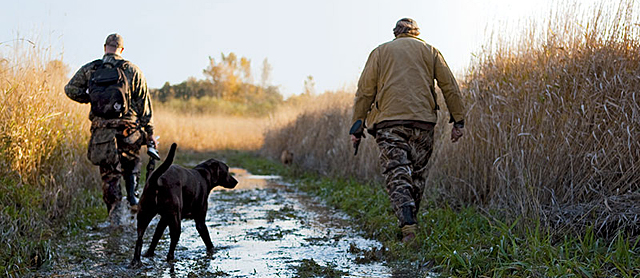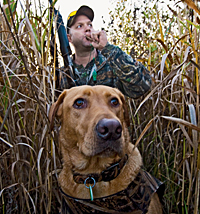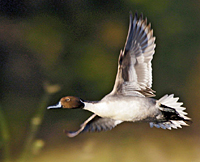sierraclub.org - sierra magazine - may/june 2010 - cattail commute


Cattail Commute
On ducks, jobs, and farmlands forever
By Jeff Galbraith
Photography by Grant Gunderson

Jeff Galbraith, left, and Dean Collins head out to set decoys in the Whatcom Wildlife Area, in Washington State. Dudley follows.
The Doctor stops suddenly on the far side of a large corn-stubble field, staring quixotically at me.
"Doc, c'mon. Let's go!"
I am waving, though conscious to make sure I don't appear frantic. It is time to go home, and the Doctor does not respond to frantic. He continues, crunching through the ice sheet, muddying the waters below, being quixotic. His steps are measured and considered.
"Doc! Dammit, c'mon!"
I try flagging him again but quickly realize the futility of bilateral discussion from 300 yards with a Labrador
retriever.
Dr. Gonzo Yellowdog finally settles next to Andrew, my friend and Doc's chosen hunting partner, and waits for one of two things to happen: (1) for me to retrieve the retriever or (2) for us to shoot some ducks.
Despite a youthful proclivity for cat feces and a continued proclivity for rolling in recently spawned salmon, Dr. Gonzo has pretty good judgment--as evidenced by his choosing to align himself with Andrew this morning. Andrew is, after all, a good shot. Myself? Some days, not so much.
"Doc! Come!"
His feigned poor hearing has now gone full-blown deaf, so I decide to break all old-school rules of dog handling by moving directly toward the spot he has chosen for us. To his credit, it is a pretty good spot. Truth is, I simply want to get up and move around. The dog just wants to hunt.
It's a stunning, balmy winter day in Washington's northern Puget Sound and the Whatcom Wildlife Area. The sun will run its low-trajectory invernal route across the horizon, from behind Mt. Baker and the Three Sisters mountains, coasting over the foothills, over fields of cut silage, over the town of Bellingham, over the bay and a few stubborn fishing skiffs pounding against the westward chop, over Samish and Guemes and Lummi Islands, before evaporating against a smoked winter sky. School buses roll past on the county roads through the morning vapor, and Andrew and Doc stare intently at the sky as I pick my way through the same muddy ice holes I created minutes earlier.
Finally, the Doctor relents and sprints toward me full tilt. Andrew waves goodbye from the blind, and we are off to the truck at the far end of the cornfield, adjacent to public land, tribal land, and a nexus of conflicting interests. The hunt has ended.
Back at the biodiesel truck, a.k.a. the Biobeast, Doc whines for a second, sniffs in Andrew's direction, and stares plaintively: What? Is this it?
Unfortunately, dude, for today, this is it.
 Dr. Gonzo and Galbraith, with eyes to the sky, watch for increasingly wise waterfowl as the day fades.
Dr. Gonzo and Galbraith, with eyes to the sky, watch for increasingly wise waterfowl as the day fades.We are in the Biobeast heading into town, past the floodplains, farmlands, derelict barns and boats, and railroad crossings. Nothing flying. Been that kind of season.
Trying to explain the appeal of hunting or fishing to a committed nonparticipant is an exercise in frustration for
all involved. But one of the most simple and personally resonant statements I've found on the subject comes from former president Jimmy Carter: "It's been part of my life since childhood, and part of my identity, like being a southerner or a Baptist... During the proper seasons, the urge within me to be in the woods and fields or along a stream is such a strong and pleasant desire that I have no inclination to withstand it."
I've hunted ducks since childhood, and it is as much a part of my Pacific Northwest heritage as digging clams, pressing apple cider, and skiing. Ultimately, I see the shooting of native waterfowl on public and heirloom rural properties as a traditional and natural right, as I do gathering chanterelles in the timberlands, riding waves in the ocean, scaling a bluff to watch a moonrise, fishing an alpine trout stream, or picking blackberries in the woods by my home.
When our lives and foods have become so detached from our local forests, mountains, rivers, deltas, and traditional farmlands that we can no longer safely or sustainably gather anything, we will have reached a bellwether of horrid proportions. Maybe we are already there. Maybe we should reforest some malls.
But I digress. We are talking about duck hunting.
Which is entirely different from duck shooting, as Dr. Gonzo can attest.
 Notable for their speed and striking appearance, pintails have made a strong comeback in the Northwest.
Notable for their speed and striking appearance, pintails have made a strong comeback in the Northwest.While in the past much of heavy industry was on the wrong side of the wildfowl and environment discussion, we now live in a world in which executives of the emerging green economy drive to work in hybrid SUVs from LEED-certified subdivisions, sipping non-GMO soy lattes as they roll down country roads formerly lined with wetlands, farms, and duck blinds--now emblazoned with the hallmarks of progress: Starbucks, yoga studios, Whole Foods, and aromatherapy outlets. Legions of shiny happy people in their own hybrid SUVs bearing bumper stickers proclaiming farmlands forever! without a hint of irony.
So these are interesting times, when it should seem a little less weird and ironic that the gas-refinery workers who live near me consider themselves environmental caretakers. "Look, we all hike and swim and kayak and mountain bike," says former world-class snowboarder, avid mountain biker and hunter, and current Shell Oil employee Dan Donnelly. "We hunt and we fish, we snowboard and we ski. Our families and children recreate outdoors, every day. The Northwest is like nowhere else, and we want to conserve this as much as anybody."
Donnelly and his friend Brian Jones have met me in the bustling confines of Boundary Bay Brewery and Bistro after a vigorous mountain bike ride through defunct timberlands. Far from the stereotyped image of blue-collar hunters as hefty, stubborn, camo-clad old morons, Donnelly and Jones are fit, young, and nobody's fools. "As long as we are, collectively, as a society, using gas, we all have a hand in responsible usage and production," Donnelly says.
While I came expecting to play antagonist with the duo, I find myself largely in agreement. And although I could peel back many layers of this discussion for potent debate, on the big-ticket items--foreign outsourcing versus domestic (and regulated) fuel refining, the need for alternative energy--I find their positions to be largely spot-on.
And when it comes to local economic opportunity, there is simply no question that the jobs afforded at the BP refinery in Cherry Point, the Shell refinery in Anacortes, and the Alcoa Intalco Works aluminum plant in Ferndale provide the kind of living wages that hemp T-shirt shops do not.
But these guys aren't spokesmen, and I'm not at an energy roundtable; we are sitting in a pub surrounded by fellow mountain bikers, anglers, paddlers, skiers, snowboarders, and a few empty-handed duck hunters. We talk about snow levels, surf conditions, bow hunting, and the lackluster waterfowling in an El Nino year. Being Washingtonians, it's hard not to also talk about the bumper salmon season, the tribes, the hatcheries, the anemic steelhead season, and a concern that a nearby quasi-public mountain-biking reserve is in foreclosure.
Not exactly the banter of earth-loathing lunkheads.
A couple of weeks later, Doc and I find ourselves searching the skies again. Swans are just beginning to filter in, their terse honks less resonant than the brassy, off-key pronouncements of the Canada and snow geese, which sometimes pour down from Siberia and Wrangell Island like a white and black river. They come to feed on the verdant salad that is the Skagit Valley, and their numbers are incredibly healthy.
But today, like during most of the season so far, the birds are high and few. Occasional wigeon and teal wing toward and then away from the small cluster of decoys we've set out--resident birds that've grown wise. We are hunkered under alder saplings planted during restoration efforts by state wildlife employees and volunteer groups. The sun blinks off the brackish ponds as two eagles parry and scream down toward the delta.
The Doctor again shows his phenomenal ability to transform from partially deaf meandering nutball to water-fowl machine, perching attentively in the cattails and tall grass while I call with increasing frustration at a sky devoid of game. Doc and I are joined by longtime Mt. Baker ski coach, hunter, and fisherman Dean Collins and his dog--the far-more-reserved Dudley.
Dudley stays close, no farther than 20 feet, as we move from pond to pond through the drainage. Dr. Gonzo, immediately realizing that we are on the move, not on the hunt, ranges out a good 100 yards, searching for moldy chum, Andrew, or errant game. I act like I care, calling him back to march in formation, until I realize I really don't care. Unless he rolls in rotting salmon. I care about that.
But once we set up in the blind, Doc's pedigree and instinct kick in. He assumes the position--nearly immobile, scanning the sky with rock-solid attentiveness. Dudley is right there with him.
Collins's work primarily consists of maintaining the runoff integrity of the area's refineries, mostly Anacortes's. By keeping a constant eye on the various retention ponds and buffers, he and his coworkers endeavor to keep pollution from the plants out of surrounding waterways.
Collins had just returned from a successful deer hunt in eastern Washington. He'd filled his tags and subsequently his freezer with wild, beyond-free-range protein, as he has every year since he was a teenager. He tells a story about lining up an epic elk hunt on private land in Montana, only to have the forgetful old rancher lose all memory of the discussion: "I called the guy a month later, and he had no idea who I was or what I was talking about." He shrugs and laughs. I laugh as well, about the fair weather and lack of fowl. What else are you going to do?
In this mostly blue-collar sporting community, to get worked up about occasionally luckless hunting, fishing, crabbing, berry picking, or whatever, is simply in poor taste. Leave the angst to the tony club hunters in their spa lodges, or to the gearheads with too many decoys, too much camo, and too little distinction between work and recreation. We like to catch and release fish, maybe go home with a few birds, but getting stressed over any of it is frowned on. We're folks with ADHD dogs, hunkering on public land, simply enjoying the deep ocher skies of a winter afternoon.
Except the Doctor. He just wants to retrieve something that falls from the air.
The light begins to wane as we keep constant check on the time. Shooting hours end precisely at 4:45 p.m. While Washington State Fish and Wildlife officers (a.k.a. "gameys") work to keep occasional violators in line, hunting is largely a self-policed affair around here, and nobody wants to be the last one back to the parking lot, explaining how those after-hours shots must have come from someone on the other side of the river.
"What time is it, Dean?"
"Time for it to turn on and us to shoot some ducks."
Dudley and Doc cock their heads in agreement.
Although the bulk of the property in the Whatcom Wildlife Area is leased or donated by the BP refinery and the Alcoa Intalco plant, and Collins has driven past it hundreds of times, until now he has never stopped and hunted here. Part of this is a matter of logistics: Most refinery workers do four 10-hour shifts per week, and Homeland Security policy now strictly prohibits firearms on refinery premises. The rule, while sensible, makes it almost impossible to hit the duck blind on the way home from work. Although today's lack of action is not likely to cause Collins to regard the place as an undiscovered hunter's paradise, I can definitely see him returning with his family and Dudley--with or without firearms--to enjoy land that is his to enjoy.
"It's just good to be out," he says. "I mean, you've got the mountains, eagles fighting on the wing, there's a few ducks flying." He motions calmly to the south, and we watch a block of pintails veer off from their V formation and descend toward the decoys. At about 100 yards, well out of range but close enough to tease, they peel off. Back to their original flight plan, back to the bay. One lone drake, however, pulls in to our left and makes an unbelievably swift pass, just barely in range on Collins's side of the blind. He snaps his 12-gauge to position, swings smoothly, and pulls. The unmistakable boom of a shotgun rolls across the marsh; the sweet smell of gunpowder hangs in the air. The pintail continues its flight, unscathed.
Dudley pokes his head a short way out of the blind to surmise the situation. The Doctor, equal parts optimist and fanatic, hits the water for a couple of cursory laps.
"Well, that's probably that," says Collins, acknowledging the remains of the day. We wade into the pond to scoop up decoys, lines, and weights.
Of course we would prefer to take home a brace of mallards each for the smoker and subsequent curry and chili, or to be sliced like carpaccio and served with crackers and jalapeno jelly--but this is not the ultimate point.
The reason we are here is the smell of tide beginning to drop back down the river, the screech of the eagles in mid-spar, the beaming white Giza of Mt. Baker, and the sunset over the San Juan archipelago. Or at least that's what I tell myself as the Doctor mopes his way back to the Biobeast.
"This place is beautiful. I can't believe I haven't been here before," Collins says as we hit the lot. "I'll do this again."
And I believe he will. The most amazing living spaces are sometimes just on the way to work.
Jeff Galbraith is the publisher of the Flyfish Journal, the Ski Journal, and frequency: The Snowboarder's Journal. He rides, skis, hunts, and fishes in Whatcom County, Washington. This story was funded by the Sierra Club's Outreach to Industrial Workers program.
Photos, from top: Grant Gunderson (2), Fredrick Sears.